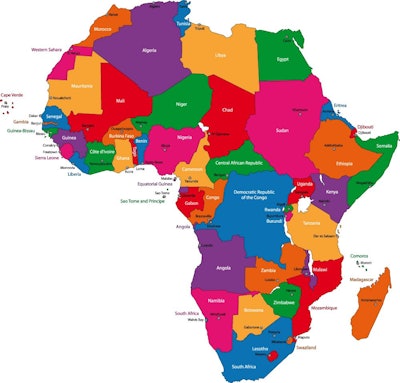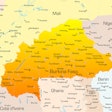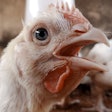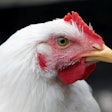
Further outbreaks of highly pathogenic avian influenza (HPAI) have been reported in poultry in South Africa, Nigeria, and Reunion.
While Nigerian farmers are faced with a shortage of corn for poultry feed, both Ghana and South Africa are reported to be considering imposing duties on imported chicken.
Over the past three weeks, further cases of HPAI have been officially confirmed in poultry in South Africa, Nigeria, and the French territory of Réunion.
For South Africa, two commercial flocks have tested positive for an HPAI virus of the H7 serotype.
According to the latest notifications to the World Organisation for Animal Health (WOAH), affected were farms in adjacent provinces in the east of the country. In each case, presence of the H7 family of viruses was confirmed following elevated mortality in the birds.
During mid-June, outbreaks occurred among more than 215,000 poultry in Gauteng, and then in a flock of 180,000 birds in Mpumalanga.
With two previous outbreaks in Mpumalanga, the latest outbreaks bring to four the total in South Africa linked to this virus family since the end of May. Directly impacted have been more than 404,000 commercial poultry. Based on the WOAH notifications, all four appear to be within around 10km of each other, to the east of Johannesburg city.
Furthermore, in early July, an HPAI outbreak linked to an H5 HPAI virus was registered with WOAH by the South African veterinary agency.
It involved more than 15,300 poultry in KwaZulu-Natal, and was the eighth outbreak in this series since mid-April. Affected have been almost 1.26 million poultry. All of the earlier cases were at farms in Western Cape.
As well as these cases in poultry, a further 57 other South African birds have been reported to WOAH as testing positive for an HPAI virus of the H5 group.
Between early April and mid-June, infections were detected in a range of wild species — pigeons, terns, and penguins — in Gauteng, Eastern Cape, KwaZulu-Natal, and Western Cape.
Confirmed HPAI outbreaks in Nigeria, Réunion
In mid-July, presence of the H5N1 HPAI virus was confirmed at a farm in Nigeria’s Lagos state, according to a recent WOAH report.
Around 1,000 of the 6,500 poultry at the premises died, and the rest have been destroyed.
The West African state’s first reported outbreak since the end of April, this brings its total to 452, and the number of birds involved to more than 2.4 million. First cases occurred there in December of 2020.
Meanwhile, a second HPAI outbreak linked to the same virus serotype was confirmed in Réunion in early July.
Affected was a backyard flock of 333 birds, around 200 of which died.
Based on WOAH notifications, this outbreak was around 30km from the previous one, which was the island’s first. Affecting a non-commercial flock of 18 birds, it began in October of last year.
Located in the western Indian Ocean, La Réunion is a department of France.
View our continuing coverage of the global avian influenza situation.
Second health issue for South African poultry owners
Widely reported among backyard flocks in South Africa is elevated mortality of birds from Gumboro disease, reported Food for Mzansi.
Also known as Infectious Bursal Disease (IBD), this affects particularly young chicks that are unable to maintain their body temperature during the cool weather of the South African winter.
Symptoms include depression, ruffled feathers, watery droppings, and dehydration.
While commercial farms generally have well insulated houses for their birds, chair of the African Poultry Producers’ general council recommends smaller flock owners use charcoal burners. When placed strategically around the house, the birds will cluster around, helping to keep each other warm, he said.
Pilane also urged owners to get their poultry vaccinated as the virus spreads easily between flocks in the air.
Prospect of Nigerian poultry farm closures
In Nigeria, a shortage of supplies and high prices of corn (maize) are putting both jobs and poultry farms at risk.
According to the Poultry Association of Nigeria, 25 million jobs in the sector are threatened, reported Leadership in mid-July.
The association has called on the Nigerian Commodity Exchange and Central Bank of Nigeria to release 40,000 metric tons of corn from the Strategic Maize Reserve Programme to the poultry industry. Furthermore, the body is urging the federal agriculture ministry to allow the sector access to 20,000mt of corn currently held as a strategic food reserve. On condition the corn is used for poultry feed and not sold on at a profit, the Association is requesting these sales at discounted prices.
The same source reported last week that 600 poultry farms in the state of Delta alone are facing closure because of the dire feed situation.
Currently, corn prices are up 75% at 405,000 naira (NGN; US$522) per metric ton. According to the local chapter of the Association, poultry farmers are unable to raise their prices because of surplus chicken and eggs supplies on the market.
Imports put pressure on poultry sector in South Africa…
Ahead of a key decision on the future of poultry meat imports in South Africa, there has been a call for the minister responsible to support domestic producers.
Founder of the FairPlay movement Francois Baird has called on trade minister Ebrahim Patel to end chicken “dumping,” reports Food for Mzansi.
According to this source, the minister will shortly announce whether it will levy duties on chicken imports from Brazil and four member states of the European Union.
Originally scheduled for August of last year, the action was postponed for 12 months in light of the cost of living crisis in South Africa.
In mitigation, Baird reports that the poultry industry has invested heavily in capacity and jobs. However, he alleges, some of the extra capacity remains unused because the government has delayed action to curb cheap imports.
Also urging the minister to implement the duties on imports of chicken agreed in principle in August of 2022 is the South African Poultry Association (SAPA).
For the past 12 months, incoming products from Brazil, Denmark, Poland, Spain, and the U.S. have been doing real harm to the domestic poultry industry, it says.
SAPA reports its own studies that show the proposed duties would increase chicken prices in the country only by a negligible amount for consumers — if at all.
Two months ago, one of South Africa’s leading poultry companies blamed ongoing disruption to the power supply
… and in Ghana
Imports of poultry meat at low prices — “dumping” — is also damaging the industry in the West African state, reported Ghana Web last week.
According to Frank Agyekum of the Ghana International Trade Commission, this includes chicken wings, backs, and feet, which are in low demand in the countries of origin. As a result, Ghana’s farmers are unable to sell their products, he alleged.
He called for government support for the West African state’s domestic poultry industry, and fair prices for locally produced chicken.
Subsequently, the same source reported a proposal to cut chicken imports by 40% in the upcoming mid-year budget.













